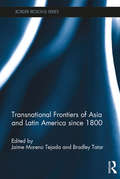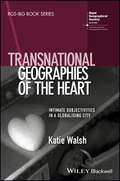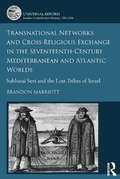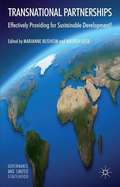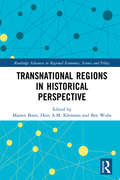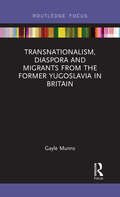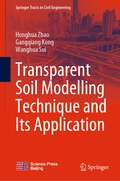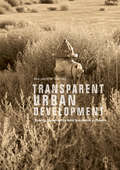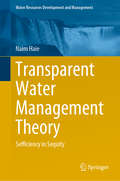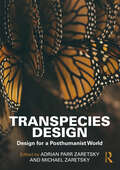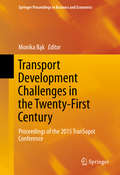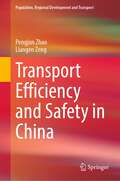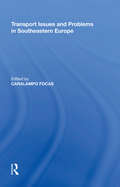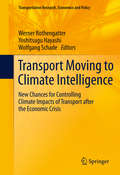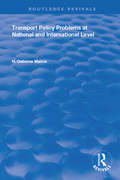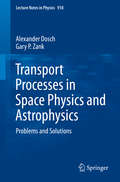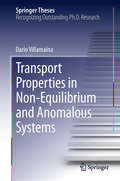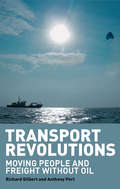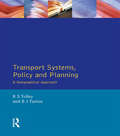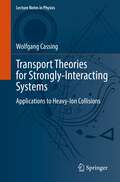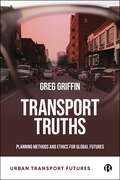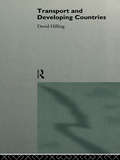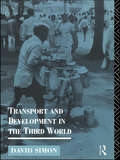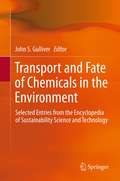- Table View
- List View
Transnational Frontiers of Asia and Latin America since 1800 (Border Regions Series)
by Jaime Moreno Tejada Bradley TatarFrontiers are "wild." The frontier is a zone of interaction between distinct polities, peoples, languages, ecosystems and economies, but how do these frontier spaces develop? If the frontier is shaped by the policing of borders by the modern-nation state, then what kind of zones, regions or cultural areas are created around borders? This book provides 16 different case studies of frontiers in Asia and Latin America by interdisciplinary scholars, charting the first steps toward a transnational and transcontinental history of social development in the borderlands of two continents. Transnationalism provides a shared focus for the contributions, drawing upon diverse theoretical perspectives to examine the place-making projects of nation states. Through the lenses of different scales and time frames, the contributors examine the social processes of frontier life, and how the frontiers have been created through the exertions of nation-states to control marginal or borderland peoples. The most significant cases of industrialization, resource extraction and colonization projects in Asia and Latin America are examined in this book reveal the incompleteness of frontiers as modernist spatial projects, but also their creativity - as sources of new social patterns, new human adaptations, and new cultural outlooks and ways of confronting power and privilege. The incompleteness of frontiers does not detract from their power to move ideas, peoples and practices across borders both territorial and conceptual. In bringing together Asian and Latin American cases of frontier-making, this book points toward a comparativist and cosmopolitan approach in the study of statecraft and modernity. For scholars of Latin America and/or Asia, it brings together historical themes and geographic foci, providing studies accessible to researchers in anthropology, geography, history, politics, cultural studies and other fields of the human sciences.
Transnational Geographies Of The Heart: Intimate Subjectivities In A Globalising City (RGS-IBG Book Series)
by Katie WalshTransnational Geographies of the Heart explores the spatialisation of intimacy in everyday life through an analysis of intimate subjectivities in transnational spaces. Draws on ethnographic research with British migrants in Dubai, United Arab Emirates, during a phase of rapid globalisation and economic diversification in 2002-2004 Highlights the negotiation of inter-personal relationships as enormously significant in relation to the dialectic of home and migration Includes four empirical chapters focused on the production of ‘expatriate’ subjectivities, community and friendships, sex and romance, and families Demonstrates that a critical analysis of the geographies of intimacy might productively contribute to our understanding of the ways in which intimate subjectivities are embodied, emplaced, and co-produced across binaries of public/private and local/global space
Transnational Networks and Cross-Religious Exchange in the Seventeenth-Century Mediterranean and Atlantic Worlds: Sabbatai Sevi and the Lost Tribes of Israel (Universal Reform: Studies in Intellectual History, 1550-1700)
by Brandon MarriottIn 1644, the news that Antonio de Montezinos claimed to have discovered the Lost Tribes of Israel in the jungles of South America spread across Europe fuelling an already febrile atmosphere of messianic and millenarian expectation. By tracing the process in which one set of apocalyptic ideas was transmitted across the Christian and Islamic worlds, this book provides fresh insight into the origin and transmission of eschatological constructs, and the resulting beliefs that blurred traditional religious boundaries and identities. Beginning with an investigation of the impact of Montezinos’s narrative, the next chapter follows the story to England, examining how the Quaker messiah James Nayler was viewed in Europe. The third chapter presents the history of the widely reported - but wholly fictitious - story of the sack of Mecca, a rumour that was spread alongside news of Sabbatai Sevi. The final chapter looks at Christian responses to the Sabbatian movement, providing a detailed discussion of the cross-religious and international representations of the messiah. The conclusion brings these case studies together, arguing that the evolving beliefs in the messiah and the Lost Tribes between 1648 and 1666 can only be properly understood by taking into account the multitude of narrative threads that moved between networks of Jews, Conversos, Catholics and Protestants from one side of the Atlantic to the far side of the Mediterranean and back again. By situating this transmission in a broader historical context, the book reveals the importance of early-modern crises, diasporas and newsgathering networks in generating the eschatological constructs, disseminating them on an international scale, and transforming them through this process of intercultural dissemination into complex new hybrid religious conceptions, expectations, and identities.
Transnational Partnerships
by Marianne Beisheim Andrea LieseWhy are some transnational public-private partnerships (PPPs) highly effective, while others are not? The contributors compare 21 transnational PPPs that seek to provide collective goods in the field of sustainable development.
Transnational Regions in Historical Perspective (Routledge Advances in Regional Economics, Science and Policy)
by Hein A.M. Klemann Ben Wubs Marten BoonNational competitiveness has become a misnomer, as competitiveness is increasingly understood as a regional phenomenon and regions are not confined to the boundaries of the nation state. This book focuses on the Port of Rotterdam and its hinterland – i.e. the Lower Rhine and the Ruhr area. A transnational perspective is imperative to understand the historical trajectories of the port, the hinterland and the region itself. This book brings geography and the transnational study of regions back into the historical discipline, linking places to larger geographical scales and to systems of production and consumption and the global chains in which they are organised. This book will be of interest to scholars and practitioners in urban studies, urban planning, public policy, geography and political science.
Transnationalism, Diaspora and Migrants from the former Yugoslavia in Britain
by Gayle MunroThe geo-political area of what once constituted Yugoslavia has been a region of significant migration since the 1960s. More recently, the conflicts in the region were the catalysts for massive displacements of individuals, families and whole communities. Thus far, there has been a gap in the literature on the qualitative experience of migrants from the former Yugoslavia through the twin theoretical lenses of transnationalism and diaspora. This book offers an ethnographic account of migration and life in diaspora of migrants originating from the former Yugoslavia and now living in Britain. Concepts such as the development of cultural beacons and diasporic borrowing are introduced through the ways in which migrants from the region form community associations and articulate - or avoid - such affiliations. The study examines the ways in which the experience of migration can be shaped by the socio-political contexts of departure and arrival, and considers how the lexicon associated with the act of migration can weave itself into the identities of migrants. The ways in which the transnational and diasporic spaces are dictated by certain narratives, for example the allegory of dreaming and the language of guilt, are explored. It also investigates migrants’ ongoing connection with the homeland, considering social and cultural elements, their reception in UK, and British media representations of Yugoslavia. Contributing to the knowledge on the experiences of migrants from a part of the world which has been under-researched in terms of its migrating populations, this book will be of interest to students and scholars of Political Geography, Social Geography, Eastern European Politics, and Migration and Diaspora studies.
Transparent Soil Modelling Technique and Its Application (Springer Tracts in Civil Engineering)
by Honghua Zhao Gangqiang Kong Wanghua SuiThis book systematically introduces the advancement of transparent soil modelling technique and its application. The transparent soil modelling technique provides an essential tool for visualizing soil-structure interaction and other geotechnical problems such as grouting, soil plugging. The geotechnical properties of the newest transparent soils were reported on model sand, clay and rock. In addition, more advanced image processing methods were summarized. In this book, numerous applications of transparent soil modelling techniques for different geotechnical problems were presented, and the results obtained are supplemented by numerical calculation and theoretical analysis.
Transparent Urban Development
by Benjamin W. StanleyThis book studies both the tangible benefits and substantial barriers to sustainable development in the city of Phoenix, Arizona. Utilizing mixed research methods to probe downtown Phoenix's political economy of development, this study illustrates how non-local property ownership and land speculation negatively impacted a concerted public-private effort to encourage infill construction on vacant land. The book elaborates urban sustainability not only as a set of ecological and design prescriptions, but as a field needing increased engagement with the growth-based impetus, structural economic forces, and political details behind American urban land policy. Demonstrating how land use policies evolved in relation to Phoenix's historical dependence on outside investment, and are now interwoven across jurisdictional scales, the book concludes by identifying policy intervention points to increase the sustainability of Phoenix's development trajectory.
Transparent Water Management Theory: Sefficiency in Sequity (Water Resources Development and Management)
by Naim HaieThis book provides a solid foundation for a comprehensive, systemic and water-centric approach to water management. Said approach integrates two performance principles essential for sustainable water use systems, namely equity and efficiency. Further, it decreases the policy space for decision-making encountered by water managers and makes it easier to arrive at reasonable solutions because of the bounded rationality inherent in its development. By combining the distributive and aggregative principles, the approach offers a transparent and autonomous structure for gathering water data and enabling stakeholder involvement. Lastly, it employs and promotes a unifying language for all types of water use systems, e.g. urban, agricultural and industrial.
Transpecies Design: Design for a Posthumanist World
by Michael Zaretsky Adrian Parr ZaretskyIn May 2019, the United Nations released the Global Assessment Report on Biodiversity and Ecosystem Services which warned that human activities will drive nearly one million species to extinction in a few decades. The primary reasons for this are habitat loss and biodiversity demise caused by changing climate, pollution, introducing nonindigenous species, clearing land, over population, and consumption. Given this situation, humans must change course as both human wellbeing and the wellbeing of other-than-human species are imbricated in one another. One way humanity can accomplish the needed transformation is to move beyond an anthropocentric view of life by embracing a transpecies approach that is premised upon interconnected flourishing.Transpecies design, as outlined in this book, offers a new approach to regenerating the natural environment while honoring biodiversity. Rather than presenting the human experience as the goal of design, transpecies design takes the inextricable linkages connecting living things as both its starting point and end goal. As such, it moves beyond human experience serving as the fundamental ingredient for making better design processes and decisions.This book is essential reading for artists, designers, and architects, as well as students of architecture, landscape architecture, interior architecture, art, product design, urban design, planning, environmental philosophy, and cultural studies.
Transport Development Challenges in the Twenty-First Century
by Monika BąkThis volume explores the field of transport sector development. Derived from the 2015 TranSopot conference held in Sopot, Poland, it discusses current trends, issues, and research on the topic. Specifically, it aims to explore sustainable development, examines current problems ranging from transport systems to transport enterprises and provides a variety of analytical methods such as economic and econometric analysis. The three most important fields of current transport research are sustainable transport development, innovation and technological progress and the conditions of transport enterprise growth and survival. Transport is an activity which is supposed to be sustainable, environmentally aware, economically optimal, socially sound and politically responsible. Striving for innovation in transport means looking for organizational and technical solutions which increase the efficiency, effectiveness and safety of transportation. However, the main research issue in the field are strategies for sustainable transport developments in urban and rural areas, instruments of internalization of external transport costs, promotion of environmentally-friendly transport behavior and improvement of transport energy efficiency. Transport infrastructure innovation, intelligent transport systems, innovations in management and finance are some of the main concerns of researchers and policy-makers in the field. Transport enterprises need to adapt to the conditions of the new economic growth perspectives. They need to create unique growth conditions, otherwise they will condemn themselves to struggle for survival. In particular, transport enterprises have to create special functioning systems and programs to diversify economic activity to use funds in the most efficient ways possible.
Transport Efficiency and Safety in China (Population, Regional Development and Transport)
by Pengjun Zhao Liangen ZengThis book is the first comprehensive analysis of transport efficiency in China. It presents a series of rigorous empirical analysis for the operation and environmental efficiencies of major transport sectors, including highway, railway, civil aviation, and waterway. It also evaluates transport safety of China. The book innovatively employs a DEA model based on Epsilon measures (EBM) to evaluate transport efficiency and an EBM DEA model with undesirable outputs to calculate transport environmental efficiency. The factors of transport efficiency are quantitatively studied, including economic growth, social transition, and technology changes. Also, China's policies aimed at improving transportation efficiency are evaluated.The theoretical analyses and discussions would enhance our existing knowledge of the changes and determinants of transport system’s efficiency in a context of rapid urbanization, industrialization, and marketization in China. The findings of the existing policy evaluation would bring fresh evidences for transport policy performances to both scholars and politicians. In particular, it shows policymakers the experiences or lessons of how to create an efficient transport system in order to save energy use, reduce GHGs emissions, and improve social security. This book is of great interest to scholars interested in sustainable transport, regional planning and development, environmental policy and is relevant to China and other developing countries.
Transport Issues and Problems in Southeastern Europe
by Caralampo FocasThe collapse of previous command economic structures in Eastern Europe has led to an often chaotic reorganization of transport operations. Southeastern Europe in particular not only lags behind the western EU countries in terms of transport infrastructure, but also in terms of management and policy. However, despite this, or perhaps even because there are no long-standing established patterns, this region is a fertile territory for innovation. Based on the first major international conference dealing with transport issues in Southeastern Europe, this edited volume brings together key researchers and policy makers to discuss and critically analyse these innovations. Focusing on issues related to privatization and harmonization of national legislation, the contributors also address the countries' struggle with inadequate management structures and the challenges posed in running shipping, ports and railways in a region fragmented into numerous nations and states. It not only provides an up-to-date overview of transport operations and planning in Southeastern Europe, but also provides more general insights into recent and current developments in a region that has undergone widespread upheavals in the past two decades, and is now experiencing renewed growth.
Transport Moving to Climate Intelligence
by Werner Rothengatter Yoshitsugu Hayashi Wolfgang SchadeTransportation contributes to roughly a fifth of greenhouse gas emissions, and as a growing sector of the economy, its contribution to climate change, if remained unchanged, could even grow. This is particularly true in the developing world, where the growth rates of air and ship transport are expected to exceed those of the EU, and worldwide objectives to curb greenhouse gas emissions by 2050 by sixty to eighty percent could be placed in serious jeopardy. This book addresses the key issues of controlling transportation growth and identifying and implementing measures that would significantly reduce the emissions of greenhouse gases from transport while maintaining its vital role in generating prosperity and mobility for future generations. This book describes the challenge that transport constitutes today as well as its role in the future for climate policy. It will discuss and provide hands-on suggestions for transportation policy that will mitigate the greenhouse gas emissions from transport. The book is organized into five parts. Part One presents an overview of transport and climate policy in the context of the recent economic crisis. Part Two examines the problems and proposed solutions for curbing emissions from transport in industrialized countries while Parts Three and Four deal with the developing world, with a particular focus on India and China. Part Five discusses tested solutions and provides policy recommendations making this book of interest to a broad audience of both policy-makers and academics concerned with the role of transport in reducing global climate change.
Transport Policy Problems at National and International Level: A Contribution by the Transport Workers' Unions (Routledge Revivals)
by International Transport Worker's FederationPublished in 1959, this book presents a study of transport problems including those of the coordination of inland transport, and special problems of coordination in areas of urban transport, civil aviation, sea ports and arising problems in the course of the economic integration of Europe.
Transport Processes and Separation Process Principles (International Series in the Physical and Chemical Engineering Sciences)
by Christie Geankoplis Allen Hersel Daniel LepekTransport Processes and Separation Process Principles, Fifth Edition, offers a unified and up-to-date treatment of momentum, heat, and mass transfer and separations processes. This edition–reorganized and modularized for better readability and to align with modern chemical engineering curricula–covers both fundamental principles and practical applications, and is a key resource for chemical engineering students and professionals alike.
Transport Processes in Space Physics and Astrophysics
by Alexander Dosch Gary P. ZankThis is the problems and solution manual for the graduate text with the same title and published as Lecture Notes in Physics Vol 877 which provides the necessary mathematical and physics background to understand the transport of gases, charged particle gases, energetic charged particles, turbulence, and radiation in an astrophysical and space physics context. The very detailed and self-contained problems and solutions will be an essential part of the training of any graduate student wishing to enter and pursuing research in this field.
Transport Properties in Non-Equilibrium and Anomalous Systems
by Dario VillamainaThe study of fluctuations in statistical physics has a long history, and a general theory is well established, connecting fluctuations to response properties of equilibrium systems. Remarkably, this framework fails as soon as some current is flowing across the system, driving it out of equilibrium. The presence of currents is quite common in nature and produces rich phenomena which are far from being included in a general framework. This thesis focuses on this general problem by studying different models such as granular materials and systems exhibiting anomalous diffusion and shows how the generalized response techniques can be successfully used to catch the relevant degrees of freedom that drive the systems out of equilibrium. This study paves the way to the use of the generalized fluctuation relations in an operative way, in order to extract information from a non-equilibrium system and to build the corresponding phenomenological theory.
Transport Revolutions: Moving People and Freight Without Oil
by Richard Gilbert Anthony PearlTransport Revolutions: Moving People and Freight without Oil sets out the challenges to our growing dependence on transport fuelled by low-priced oil. These challenges include an early peak in world oil production and profound climate change resulting in part from oil use. It proposes responses to ensure effective, secure movement of people and goods in ways that make the best use of renewable sources of energy while minimizing environmental impacts. Transport Revolutions synthesizes engineering, economics, environment, organization, policy and technology, and draws extensively on current data to present important conclusions. The authors argue that land transport in the first half of the 21st century will feature at least two revolutions. One will involve the use of electric drives rather than internal combustion engines. Another will involve powering many of these drives directly from the electric grid - as trains and trolley buses are powered today - rather than from on-board fuel. They go on to discuss marine transport, whose future is less clear, and aviation, which could see the most dramatic breaks from current practice. With its expert analysis of the politics and business of transport, Transport Revolutions is essential reading for professionals and students in transport, energy, town planning and public policy.
Transport Systems, Policy and Planning: A Geographical Approach
by Rodney Tolley Brian John TurtonProvides a unique review of the major spatial aspects of transport systems, a detailed analysis of transport problems in urban and rural areas, an evaluation of social and environmental impacts, and a planning and policy overview. Divided into four parts, each considering a different aspect of transport geography. The first part outlines the basic geography of transport and examines transport and spatial structures, focusing upon the varying contributions made by transport to industrial, agricultural and urban development. Part two moves to consider specific transport systems at both national and international scales, drawing on studies from industrialised and developing nations and discussing the effects upon transport of the political changes in the former USSR and Eastern Europe. The third part examines some of the many problems of transport and urban and rural areas using specific examples to illustrate the contrasting difficulties and evaluate current urban transportation planning methods.
Transport Theories for Strongly-Interacting Systems: Applications to Heavy-Ion Collisions (Lecture Notes in Physics #989)
by Wolfgang CassingThis book provides an overview on transport theories, focusing on applications and the relativistic off-shell transport theory which are of particular interest for physicists working in the field of relativistic strong-interaction physics, e.g. relativistic or ultra-relativistic heavy-ion collisions or the evolution of the early universe. In this regard, a thorough derivation of the transport equations and a careful analysis of the approximations employed is given. The text is enriched with a multitude of Appendices that partly recall elements of quantum mechanics and field theory or present examples for specific models. Specific exercises are given throughout the chapters. As a basic knowledge the reader should be familiar with quantum mechanics and its principles as well as some basic concepts of the quantum many-body physics and field theory. All chapters close with a short summary and numerical calculations are provided to master and illustrate the subject.
Transport Truths: Planning Methods and Ethics for Global Futures (Urban Transport Futures)
by Greg P. GriffinIdeal for researchers and practitioners looking for fresh approaches to transport problems, this book combines cutting-edge qualitative and quantitative knowledge to inform transport futures. It uses engaging case studies of the Banjul Airport Expansion in The Gambia, and the Interstate 35 development project in Austin, US to show how and why a transdisciplinary approach can result in better planning decisions. As cities grow, shrink, and re-organize, with access provided by transport infrastructure, this book demonstrates the value of critical realism to create lasting, positive impacts on society and the environment.
Transport and Developing Countries
by Dr David Hilling David HillingImpassable roads, poorly maintained railways, bankrupt airlines, congested cities, and inefficient ports - are there links between these issues and lack of economic progress in developing countries? Inland waterways, ports, railways, roads, air and urban transport are all discussed and illustrated with examples of good and bad practice. The author explains how transport can only be effective if timing, location and technology are chosen carefully and if decisions are in the hands of the right parties.
Transport and Development in the Third World (Routledge Introductions to Development)
by David SimonIt is widely acknowledged that transport is a necessary condition for development to occur. Transport issues have become highly contentious and politicised. This volume presents a balanced review of transport provision and the development process in the Third World. Providing a comprehensive survey of the range of transport modes and forms utilised in rural, urban and international contexts, the book examines the development implications of such choices, together with appropriate policies to address transport problems in the Developing World. This is a stimulating and provocative text. Its distinctive structure and logic challenge conventional wisdoms, and raise key issues seldom addressed in transport courses.
Transport and Fate of Chemicals in the Environment
by John S. GulliverWhat happens when a chemical is released into the environment? It diffuses, disperses, adsorbs, reacts, and/or changes state. To predict and analyze this process, the mathematics of diffusion is applied to lakes, rivers, groundwater, the atmosphere, the oceans, and transport between these media. A sustainable world requires a deep understanding of the transport of chemicals through the environment and how to address and harness this process. This volume presents a succinct and in-depth introduction to this critical topic. Featuring authoritative, peer-reviewed articles from the Encyclopedia of Sustainability Science and Technology, Transport and Fate of Chemicals in the Environment represents an essential one-stop reference for an audience of researchers, undergraduate and graduate students, and industry professionals.
